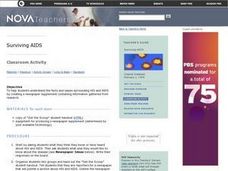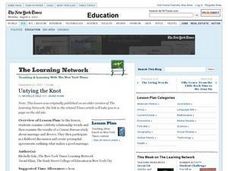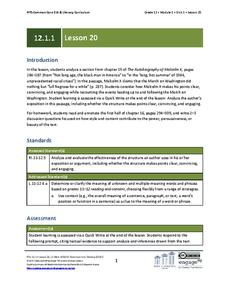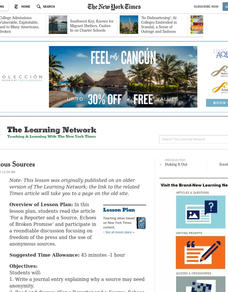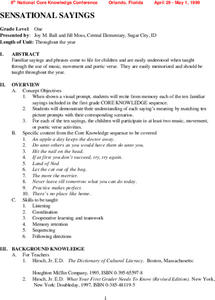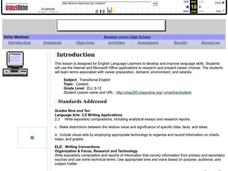Curated OER
Denial on Trial
What is the "Faurisson Affair”? What is “Holocaust Revisionism”? What does freedom of speech entail? Do revisionists have a right to voice their ideas? Such questions are at the heart of a richly detailed, thought provoking lesson...
Curated OER
The Ethics of Outsourcing to China
After viewing clips from a documentary on factory work in China and US outsourcing, learners have a fishbowl discussion. They work in groups to build both personal points of view and strong arguments on the effects of outsourcing in...
Scholastic
Recovery From Drug Addiction
Are there factors that put some individuals at a higher risk for drug addiction than others? Learn more about the risk factors that may make some people more susceptible to addiction, as well as protective factors that help prevent...
Curated OER
Following the Leaders
Examine the historic election of Pope Benedict XVI and reflect on the challenges he faces as the new leader of the Catholic Church. This New York Times lesson investigates how other world leaders are chosen in different forms of...
Curated OER
The War of the Words
“Who’s This Guy Dylan Who’s Borrowing Lines From Henry Timrod?” The basic question in this instructional activity from the New York Time’s Learning Network is whether artists and authors who use the words of others are stealing from that...
Curated OER
Surviving AIDS
Enhance your middle and high schoolers' research skills with this lesson. After viewing a video clip about HIV and AIDS, high schoolers identify the facts and issues surrounding the disease. They work together to create a newspaper...
Curated OER
Untying the Knot
What are the current trends in divorce? What contributes to this? Examine celebrity relationship trends and how they relate to the general public with this discussion lesson. Middle schoolers analyze the results of a Census Bureau study...
EngageNY
Grade 12 ELA Module 1: Unit 1, Lesson 20
The March on Washington takes center stage in the discussion of chapter 15 of The Autobiography of Malcolm X; however, class members are presented with an entirely different view of the march from the ones they have previously studied....
Curated OER
Anonymous Sources in the Media
When do people ask for anonymity? Why? After reading the New York Times article "For a Reporter and a Source, Echoes of Broken Promise," young readers participate in a roundtable discussion focusing on freedom of the press and the use of...
Curated OER
Shame on You!
Should public humiliation be an acceptable consequence for a crime? Have your middle schoolers engage in a round table discussion about the recent resurgence of the use of public humiliation as a punishment for crimes in the United...
Curated OER
Expressing Your Views to the Letter
Analyze the motivation, purpose, and value of letters to the editor by examining letters written in response to the violence at Columbine High School. For homework, middle and high schoolers write their own letters to the editor about an...
Curated OER
Rave Reviews
A fun instructional activity that utilizes toys and persuasion! After reading the article, which was written in 2005, pull some advertisements for toys currently being sold. These will be more relevant to your middle and high schoolers....
Curated OER
Arti-Factual Evidence
Practice responding to controversial information with the New York Times lesson provided here. Middle schoolers watch a video interview with the director of The Lost Tomb of Jesus. After reading a companion article, they identify...
Curated OER
What a Relief!
How are disasters addressed by the Federal Government? This New York Times lesson plan, based on the article "Disaster Aid: The Mix of Mercy and Politics," prompts middle schoolers to discuss the idea of using a disaster declaration as a...
Curated OER
Lesson Exchange: Introduction to Research Papers (Senior, Literature)
Although unlikely in today's English classroom, this lesson focuses on introducing research papers to seniors in high school. It briefly reviews the parts of an essay, and mentions showing learners example essays, but no examples are...
Southern Nevada Regional Professional Development Program
Common Core Reading Standards: Understanding Argument
What does your class know about logical fallacies? They can find out quite a bit and practice identifying logical fallacies if you follow the steps and use the resources provided here! After reviewing ethos, pathos, and logos, ask small...
Shmoop
ELA - Literacy.CCSS.ELA-Literacy.RH.9-10.1
Do your pupils know what a primary source is? How about a secondary source? Provide them with the information here about different types of documents and then test their knowledge with a brief quiz. The quiz is made up of two documents....
Curated OER
Sensational Sayings
Students recognize and interpret the meaning of proverbs and saying through music, poetry and movement. In this familiar sayings lesson, students participate in various games and activities to gain understanding of the meanings of...
BrainPOP
Coping with Bullying Lesson Plan: Strategies for Real-Life Situations
Offer young scholars strategies for dealing with bullies with help from BrainPop Jr.'s favorite characters, Annie and Moby. Youngsters watch a video, take part in a grand conversation, and play a game designed to reinforce...
Curated OER
Rooting One's Way to Meaning
Discover the Virtual Thesaurus with your class. They use the Virtual Thesaurus to assist them in an inquiry-based approach to discovering the meanings of some common Latin and Greek roots. Each child then teaches a particular root and...
Curated OER
Exploring Careers
The world is full of possibilities for your ELLs. Help them explore their career options with a lesson that incorporates Internet research and expository writing. Not only will they learn more about their careers of choice, but both...
Texas Center for Learning Disabilities
Second-Grade Comprehension-Based Intervention
Help your youngsters find meaning in the text they read with this series of five intervention lessons. Offering explicit, step-by-step instructions for walking children through shared readings of leveled books, these...
Texas Center for Learning Disabilities
Second-Grade Explicit Intervention
Unfortunately, not all students learn to read at the same pace, but with the help of this resource, you can ensure that they all receive the support they need to reach this important goal. Comprised of short...
Texas Center for Learning Disabilities
Fourth-Grade Text-Based Intervention
Provide young readers with the extra support they need using this series of 10 literacy lessons. Following a repeated sequence of learning activities, these lessons engage children in expanding their vocabulary...







